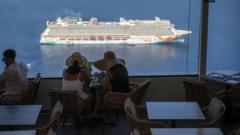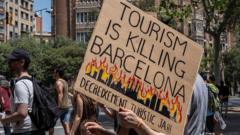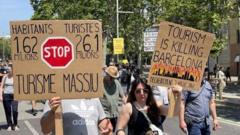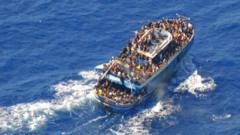As thousands of earthquakes force potential changes in travel and staffing, Santorini is bracing for challenges ahead in its crucial tourism sector.
Santorini Faces Uncertainty as Earthquakes Shake Tourism Industry

Santorini Faces Uncertainty as Earthquakes Shake Tourism Industry
Fears mount for the summer tourist season as earthquakes disrupt travel plans on Greece's Santorini island.
In February, Santorini typically welcomes visitors as the tourist season gears up with the arrival of cruise ships and the Easter holiday. However, a series of earthquakes that began shaking the island in January has already caused one cruise line to cancel its stop, raising concerns about this vital industry for Santorini, which supports a population of just over 15,000 and sees many tens of thousands of tourists daily in peak season.
Antonis Pagonis, president of Greece's Association of Hoteliers, reported a drop in bookings. "We hope this will be short-lived,” he stated, but there are growing worries about staffing shortages at hotels. Many seasonal workers from other regions usually flock to Santorini for employment during the busy summer months. The uncertainty surrounding tourism is pushing some of them, like bartender Manos, to seek opportunities elsewhere. Fearful of fewer tourists leading to diminished earnings and job security, Manos has opted for a position in Corfu instead.
As construction activities to prepare hotels for summer also come to a halt due to safety concerns from the earthquakes, hotel owners are advocating to the government for financial support to retain employees. Mr. Pagonis indicated that while the government has responded positively, the actual implementation of aid measures is uncertain.
Despite having declared a state of emergency to address immediate risks, some tourism experts believe that long-term investments in Santorini's infrastructure are necessary. Margarita Karamolegkou, who owns four hotels, emphasized that improvements like a new port and stricter regulations for rental properties are crucial for the island's future resilience.
Santorini contributes around 2.5% to Greece’s GDP, generating an estimated €5.9 billion annually. While there have been no confirmed cancellations thus far, the tourism industry reports a downward trend in bookings, with dire forecasts if this continues. Highlighting the significance of the island, Prime Minister Kyriakos Mitsotakis stated that protecting Santorini's reputation is critical for its future.
Although the situation is daunting, Karamolegkou remains hopeful, assuring that her hotels will adhere to high service standards, even if staff numbers are reduced. "We have been in this business for decades”, she reflected, showing determination to uphold the island’s tourism legacy despite the seismic challenges.
As the summer draws near, Santorini's residents and business owners remain vigilant and resilient, hoping for a positive turn in the industry amidst the ongoing concerns.
Antonis Pagonis, president of Greece's Association of Hoteliers, reported a drop in bookings. "We hope this will be short-lived,” he stated, but there are growing worries about staffing shortages at hotels. Many seasonal workers from other regions usually flock to Santorini for employment during the busy summer months. The uncertainty surrounding tourism is pushing some of them, like bartender Manos, to seek opportunities elsewhere. Fearful of fewer tourists leading to diminished earnings and job security, Manos has opted for a position in Corfu instead.
As construction activities to prepare hotels for summer also come to a halt due to safety concerns from the earthquakes, hotel owners are advocating to the government for financial support to retain employees. Mr. Pagonis indicated that while the government has responded positively, the actual implementation of aid measures is uncertain.
Despite having declared a state of emergency to address immediate risks, some tourism experts believe that long-term investments in Santorini's infrastructure are necessary. Margarita Karamolegkou, who owns four hotels, emphasized that improvements like a new port and stricter regulations for rental properties are crucial for the island's future resilience.
Santorini contributes around 2.5% to Greece’s GDP, generating an estimated €5.9 billion annually. While there have been no confirmed cancellations thus far, the tourism industry reports a downward trend in bookings, with dire forecasts if this continues. Highlighting the significance of the island, Prime Minister Kyriakos Mitsotakis stated that protecting Santorini's reputation is critical for its future.
Although the situation is daunting, Karamolegkou remains hopeful, assuring that her hotels will adhere to high service standards, even if staff numbers are reduced. "We have been in this business for decades”, she reflected, showing determination to uphold the island’s tourism legacy despite the seismic challenges.
As the summer draws near, Santorini's residents and business owners remain vigilant and resilient, hoping for a positive turn in the industry amidst the ongoing concerns.




















